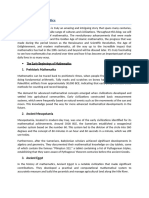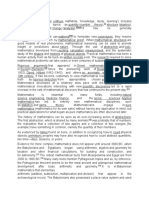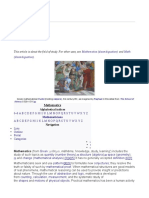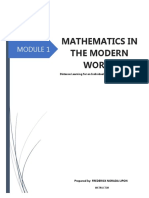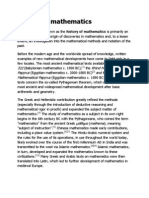History_of_Mathematics
History_of_Mathematics
Uploaded by
RLCopyright:
Available Formats
History_of_Mathematics
History_of_Mathematics
Uploaded by
RLCopyright
Available Formats
Share this document
Did you find this document useful?
Is this content inappropriate?
Copyright:
Available Formats
History_of_Mathematics
History_of_Mathematics
Uploaded by
RLCopyright:
Available Formats
History of Mathematics
Introduction
Mathematics, a universal language of numbers and symbols, has been a fundamental part of
human civilization for thousands of years. From ancient numeration systems to modern
computational mathematics, the evolution of this discipline has been driven by the need to
solve practical problems, the pursuit of intellectual curiosity, and the intrinsic beauty found
in logical reasoning.
Ancient Beginnings
The history of mathematics begins with the early civilizations who developed numeration
systems. The ancient Sumerians and Egyptians used early forms of arithmetic and geometry
around 3000 BCE for taxation, construction, and astronomy. Notably, the Babylonians
introduced the basics of what would become algebra and developed an advanced number
system that made calculations more efficient.
Classical Contributions
Greek mathematicians such as Pythagoras, Euclid, and Archimedes are often credited with
shaping the foundation of classical mathematics. Euclid's 'Elements' became one of the most
influential works in the history of mathematics, formulating the axiomatic method still used
today. Archimedes' work on calculus predates Newton and Leibniz by over 2000 years.
Medieval and Renaissance Developments
During the medieval period, Islamic scholars preserved and expanded upon the classical
knowledge and were instrumental in introducing this knowledge to Europe. The
Renaissance furthered mathematical development, leading to advances in algebra,
geometry, and the eventual emergence of calculus during the 17th century by
mathematicians like Isaac Newton and Gottfried Wilhelm Leibniz.
Modern Mathematics
The 19th and 20th centuries saw an explosion in mathematical theory with developments in
areas such as statistics, abstract algebra, and complex analysis. The advent of computers has
further transformed mathematics, allowing for the processing of complex algorithms and
large-scale computations that are essential in modern sciences and engineering.
Conclusion
Today, the field of mathematics continues to grow at a rapid pace, pushing the boundaries
of what is known and expanding into new realms such as theoretical computer science,
mathematical biology, and financial mathematics. As we advance, the history of
mathematics remains a testament to human creativity and intellect, highlighting the
profound impact that this discipline has had on the development of human society.
You might also like
- History of MathematicsDocument4 pagesHistory of MathematicsAilyn Joy BesanaNo ratings yet
- The Story of Mathematics: From creating the pyramids to exploring infinityFrom EverandThe Story of Mathematics: From creating the pyramids to exploring infinityRating: 4 out of 5 stars4/5 (8)
- FLDKDKDDDocument1 pageFLDKDKDDsmileskillsme009No ratings yet
- From Ancient Civilizations To Modern InnovationsDocument1 pageFrom Ancient Civilizations To Modern InnovationsJuwana ManNo ratings yet
- History of MathDocument2 pagesHistory of Mathtisyasureka14No ratings yet
- The History of Mathematics Is A Long and Winding OneDocument2 pagesThe History of Mathematics Is A Long and Winding OneDK the epic drummerNo ratings yet
- History of MathematicsDocument4 pagesHistory of MathematicsMuhammad Ilyas TahirNo ratings yet
- Math's and HistoryDocument11 pagesMath's and Historyhuzaifaharis58No ratings yet
- TTH Module 1Document4 pagesTTH Module 1anghelikaortiz09No ratings yet
- History of MathematicsDocument2 pagesHistory of MathematicsMoath AlnajjarNo ratings yet
- Basic Calculus C.E.R.A.E: History of MathematicsDocument5 pagesBasic Calculus C.E.R.A.E: History of MathematicsRodolf Gerone G. MacahilosNo ratings yet
- Mathematics: 322 (Babylonianc. 1900 BC)Document2 pagesMathematics: 322 (Babylonianc. 1900 BC)Victor Hugo ChoqueNo ratings yet
- 07 History of Math WPDocument37 pages07 History of Math WPjesscorpuzblando050101No ratings yet
- Another Essay by MeDocument2 pagesAnother Essay by Meex223456No ratings yet
- Mathematics (from Greek: μάθημα, máthēma, 'knowledge, study, learning') includesDocument2 pagesMathematics (from Greek: μάθημα, máthēma, 'knowledge, study, learning') includesVincent Luigil AlceraNo ratings yet
- Mathematics EssayDocument15 pagesMathematics Essayboiorange81No ratings yet
- The Birth and Evolution of CalculusDocument10 pagesThe Birth and Evolution of CalculusShyamNo ratings yet
- MMW M1 PDFDocument2 pagesMMW M1 PDFndjwndnnd sjwjhsbdbdbdNo ratings yet
- History of MathematicsDocument2 pagesHistory of MathematicspoojaNo ratings yet
- Mathematics - WikipediaDocument30 pagesMathematics - WikipediaRohit MarandiNo ratings yet
- Lesson 1Document17 pagesLesson 1Samantha DuronNo ratings yet
- History of MathematicsDocument6 pagesHistory of MathematicsAryaman PathakNo ratings yet
- Who Invented Math and When?: Students Have A Complicated Relationship With MathematicsDocument6 pagesWho Invented Math and When?: Students Have A Complicated Relationship With Mathematicsamazonmarket755No ratings yet
- Which Is Most Important?: Formula and Used Number System Study of Mathematics Logic RenaissanceDocument1 pageWhich Is Most Important?: Formula and Used Number System Study of Mathematics Logic Renaissancemr1darknessNo ratings yet
- History of MathematicsDocument3 pagesHistory of MathematicsAnup kumar mishraNo ratings yet
- Reading AlgebraDocument2 pagesReading AlgebraHILWA AINUSYIFANo ratings yet
- A-Journey-Through-Time-Exploring-the-Medieval-and-Renaissance-Eras-in-MathematicsDocument10 pagesA-Journey-Through-Time-Exploring-the-Medieval-and-Renaissance-Eras-in-MathematicsRizabel SacapañoNo ratings yet
- Essay AHistoryofMathematicsDocument14 pagesEssay AHistoryofMathematicsZeref V. DragNellNo ratings yet
- Module 1. History of MathematicsDocument3 pagesModule 1. History of MathematicsAzuma JunichiNo ratings yet
- The Area of Study Known As The History of Mathematics Is Primarily An Investigation Into The Origin of Discoveries in Mathematics andDocument2 pagesThe Area of Study Known As The History of Mathematics Is Primarily An Investigation Into The Origin of Discoveries in Mathematics andshaikha AlbuqaishNo ratings yet
- doc4Document1 pagedoc4marktom1923No ratings yet
- A History of MathematicsDocument6 pagesA History of MathematicsAnnie RecileNo ratings yet
- Mathematics: This Article Is About The Field of Study. For Other Uses, See andDocument6 pagesMathematics: This Article Is About The Field of Study. For Other Uses, See andrNo ratings yet
- History of MathematicsDocument5 pagesHistory of MathematicssirNo ratings yet
- Felopateer Emad Talaat - Math Research Psper - The History and Applications of CalculusDocument24 pagesFelopateer Emad Talaat - Math Research Psper - The History and Applications of Calculusfilo emadNo ratings yet
- History of MathematicsDocument2 pagesHistory of MathematicsAydu NatnowNo ratings yet
- Mathematics: See AlsoDocument5 pagesMathematics: See AlsoEduardo RojasNo ratings yet
- Module 1 Ge 114Document8 pagesModule 1 Ge 114frederick liponNo ratings yet
- Mathematics Education Philosophy of MathematicsDocument11 pagesMathematics Education Philosophy of MathematicsabcNo ratings yet
- History of MathematicsDocument1 pageHistory of MathematicsNithin MohanNo ratings yet
- Banlasan Assgn#2Document1 pageBanlasan Assgn#2Krissa BanlasanNo ratings yet
- Hist MATDocument6 pagesHist MATLuz Malvy SuarezNo ratings yet
- ACFrOgAZU7IutYgfSdKND6kAOIrkiXYsuL4Sflg4WDyypiD5ZKpPO2r1Fq2eOiCTdj1whpz2cAJLzGZyuFqMvYaYReZEi8ESzYsWL WTPXJKXPTCWQDM LQHYz231ceLk8ZHCCl apZsATlkyPBoDocument3 pagesACFrOgAZU7IutYgfSdKND6kAOIrkiXYsuL4Sflg4WDyypiD5ZKpPO2r1Fq2eOiCTdj1whpz2cAJLzGZyuFqMvYaYReZEi8ESzYsWL WTPXJKXPTCWQDM LQHYz231ceLk8ZHCCl apZsATlkyPBoVLADEMIER ANDONo ratings yet
- MathematicsDocument7 pagesMathematicsKhadka SatishNo ratings yet
- MathDocument3 pagesMathpepanovak74No ratings yet
- in History and Philosophy of MathematicsDocument29 pagesin History and Philosophy of Mathematicssamuel.florescaNo ratings yet
- Number TheoryDocument17 pagesNumber TheoryStephanie Joy PascuaNo ratings yet
- Prehistoric Mathematics: Plimpton 322 Rhind Mathematical Papyrus Moscow Mathematical PapyrusDocument3 pagesPrehistoric Mathematics: Plimpton 322 Rhind Mathematical Papyrus Moscow Mathematical Papyruswenny capplemanNo ratings yet
- In ContemporaryDocument13 pagesIn ContemporaryjetryllmasamlokNo ratings yet
- EnglishDocument1 pageEnglishLes SeñarNo ratings yet
- History of Mathematics Lesson 2Document4 pagesHistory of Mathematics Lesson 2Mike GbassanaNo ratings yet
- MATHEMATICSDocument3 pagesMATHEMATICSsch.gela.filesNo ratings yet
- Mathematics Before Christ: ContentDocument19 pagesMathematics Before Christ: ContentRodolf Gerone G. MacahilosNo ratings yet
- History of Mathematics & Its ApplicationsDocument18 pagesHistory of Mathematics & Its ApplicationsChie ChieNo ratings yet
- Scribd 1Document15 pagesScribd 1'Prasada WedatamaNo ratings yet
- Week 2 3 1glimpse of Math history-REVISED-1Document27 pagesWeek 2 3 1glimpse of Math history-REVISED-1Shane PenuliarNo ratings yet
- History of MathematicsDocument2 pagesHistory of MathematicsPRINTDESK by DanNo ratings yet
- History of MathematicsDocument5 pagesHistory of MathematicsJules Christian Panganoron CruzNo ratings yet
- History of Mathematics & Its ApplicationsDocument18 pagesHistory of Mathematics & Its Applicationsluzviminda veliliaNo ratings yet
- Mathematics: Jump To Navigation Jump To SearchDocument9 pagesMathematics: Jump To Navigation Jump To SearchJeje NutNo ratings yet






